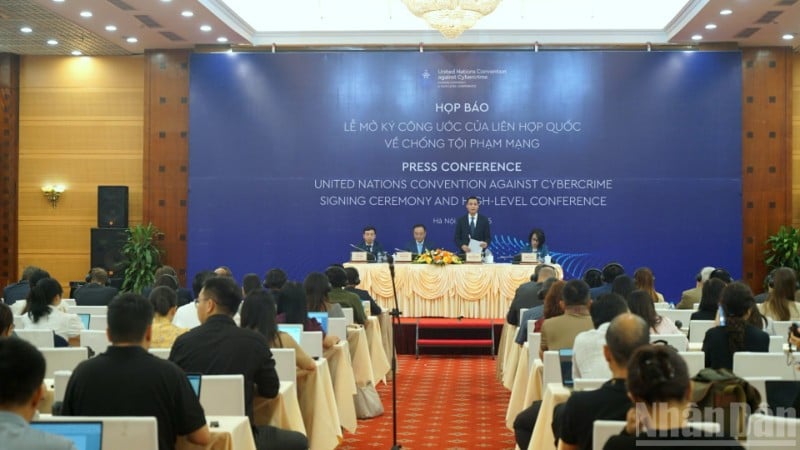
Scene of the international press conference on the signing ceremony of the United Nations Convention against Cybercrime. (Photo: TRUNG HUNG)
That is the comment of Dr. Tran Hai Linh, member of the Central Committee of the Vietnam Fatherland Front, Chairman of the Vietnam-Korea Businessmen and Investment Association (VKBIA), founding Chairman of the Vietnam-Korea Experts and Intellectuals Association (VKEIA) in an interview with Nhan Dan Newspaper reporter about the significance of the United Nations Convention against Cybercrime with the theme "Combating Cybercrime - Sharing Responsibility - Towards the Future" ( Hanoi Convention) being opened for signing in Vietnam at the end of October 2025.
Reporter: On October 25 and 26, the signing ceremony of the United Nations Convention against Cybercrime will take place in Hanoi with the theme "Fighting Cybercrime - Sharing Responsibility - Looking to the Future". So, could you tell us what is the significance of the signing of the Hanoi Convention in Vietnam for Vietnam's international position, especially in the field of cyber security and international legal cooperation?
Dr. Tran Hai Linh: The signing of the Hanoi Convention in Vietnam is of great significance, not only in terms of international law but also affirms Vietnam's position, prestige and global integration capacity in the digital age. This is the first time a major international convention on preventing and combating cybercrime and cross-border electronic judicial cooperation has been named after the capital Hanoi - the political and diplomatic center of Vietnam.
First of all, this demonstrates the international community’s trust and recognition of Vietnam’s proactive and positive role in promoting the building of a safe, transparent and responsible cyberspace. Vietnam is not only a beneficiary country but also contributes its intelligence, voice and initiatives to the international process on cyber security.
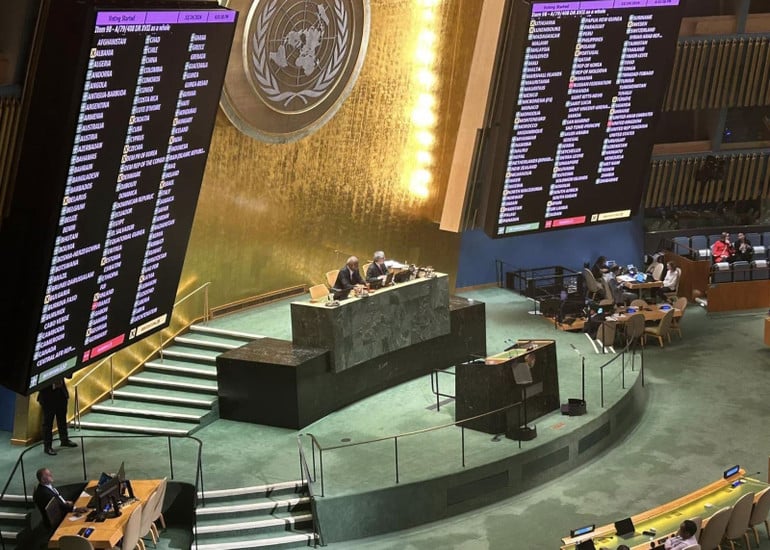
On the afternoon of December 24, 2024 (New York time), the United Nations General Assembly unanimously adopted the United Nations Convention against Cybercrime. According to Article 64 of the Convention, this document will be opened for signature in Hanoi in 2025. Accordingly, the Convention is called the "Hanoi Convention". (Photo: VNA)
Second, the Hanoi Convention opens up opportunities for Vietnam to enhance international legal cooperation, especially in handling high-tech crimes, protecting personal data, and responding to cross-border challenges in cyberspace. This is an important basis for Vietnam to improve its investigation, prosecution, and trial capacity, while creating a solid legal corridor to attract digital investment and strengthen the trust of international partners.
Finally, the fact that the Convention is named after “Hanoi” is also a symbol of the spirit of integration and global responsibility of Vietnam - a country that is strongly transforming from a “participant” to a “rule-maker” in global issues. That contributes to enhancing Vietnam’s position, influence and image in the international arena, in line with the foreign policy of “self-reliance, proactiveness, positivity and deep integration” that the Party and State are implementing.
The signing of the United Nations Convention against Cybercrime with the theme “Combating Cybercrime – Sharing Responsibility – Towards the Future” in Vietnam is of great significance, not only in terms of international law but also affirms Vietnam’s position, prestige and global integration capacity in the digital age. This is the first time a major international convention on preventing and combating cybercrime and cross-border electronic judicial cooperation has been named after the capital Hanoi – the political and diplomatic center of Vietnam.
Dr. Tran Hai Linh, Member of the Central Committee of the Vietnam Fatherland Front, Chairman of the Vietnam-Korea Business and Investment Association
Reporter: How do you assess Vietnam's leading role in the Convention negotiation process, especially in reconciling differences between countries to reach consensus?
Dr. Tran Hai Linh: I believe that Vietnam's leading role in the negotiation of the Hanoi Convention is a prominent highlight, demonstrating Vietnam's diplomatic mettle, coordination capacity and growing international prestige in the global arena.
In a world where there are still many differences in approaches to cybersecurity, digital sovereignty and data privacy, Vietnam has demonstrated its role as a “dialogue bridge” between groups of countries with different legal systems, levels of development and interests. Flexibility and ingenuity in diplomacy combined with the principle of respecting international law and the legitimate interests of all parties have helped Vietnam reconcile viewpoints, thereby promoting the negotiation process to reach a rare consensus.
In particular, Vietnam’s role as host and co-chair of many key negotiation sessions demonstrates its ability to “lead by trust” – a form of soft power typical of Vietnam in modern multilateral diplomacy. Instead of imposing or confronting, Vietnam chooses to build consensus, promote cooperation and jointly address global challenges in the spirit of “cyber security is a common interest of humanity”.
From that perspective, it can be affirmed that Vietnam not only contributes to shaping the content of the Convention, but also shapes a new method of international dialogue, marked by openness, substance and harmony of interests - which is very necessary in the context of the world moving towards a more equitable and sustainable digital order.
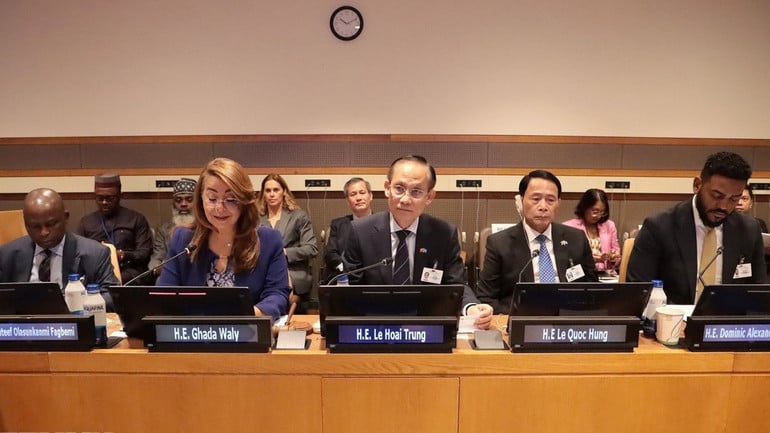
On September 22, 2025, the Ministry of Foreign Affairs and the Ministry of Public Security of Vietnam, in coordination with the United Nations Office on Drugs and Crime (UNODC), co-organized the event "The Road to Hanoi: Opening Ceremony of the United Nations Convention against Cybercrime - Honoring Multilateralism for a Safe Digital Future". In photo: Co-chairs of the event. (Photo: VNA)
Reporter: In the context of geopolitical competition between major powers, how has Vietnam demonstrated its ability to balance interests and promote cooperation in the process of building the Convention, sir?
Dr. Tran Hai Linh: In the context of increasingly fierce geopolitical competition among major powers, Vietnam's proactive and balanced role in the process of building the Hanoi Convention is a clear demonstration of Vietnam's independent, self-reliant, and flexible multilateral foreign policy thinking.
Vietnam does not take sides in competing interests, but focuses on the common interests of the international community - that is, building a safe, trustworthy and human-serving cyberspace. Throughout the negotiation process, Vietnam has demonstrated its capacity to mediate and reconcile differences in viewpoints between developed and developing countries, and between blocs with different approaches to security, privacy and digital sovereignty.
Vietnam’s calm, steadfast yet flexible diplomatic stance has helped maintain open dialogue and substantive cooperation, avoiding the Convention becoming a tool for political competition or imposing values. Vietnam has skillfully applied “bamboo diplomacy” – strong roots, flexible trunk, far-reaching branches – to both protect national interests and contribute to global interests.
Through this, Vietnam has demonstrated its ability to “be friends with all, confront no one”, while promoting cooperation based on international law, equality and mutual benefit. It is this balance and prestige that has helped Vietnam become a center of trust, where countries can dialogue and find common ground in a sensitive area such as cyber security.
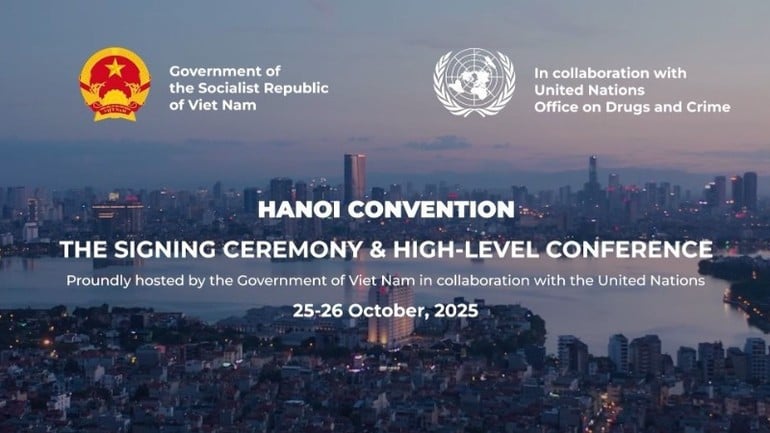
Hanoi will host the signing ceremony of the United Nations Convention against Cybercrime from October 25 to 26, 2025. (Screenshot: TRUNG HUNG)
Reporter: In your opinion, what impact can the Hanoi Convention have on the region and the world in enhancing cooperation in preventing and combating cybercrime? What lessons from this process can be applied to other multilateral initiatives?
Dr. Tran Hai Linh: The Hanoi Convention is not only a new international legal document in the field of cyber security, but also a symbol of the spirit of cooperation, trust and global responsibility in the digital age. The impact of this Convention will spread in many directions, especially in strengthening the coordination mechanism between countries in preventing and combating cross-border cybercrime - a challenge that no country can solve on its own.
First of all, the Convention will help establish a unified legal cooperation platform, creating a basis for countries to share information, support investigations, extradition and handle cybercrime more effectively, while ensuring human rights, privacy and digital sovereignty of each country. This is especially meaningful in the context of the Asia-Pacific region becoming the epicenter of digital transformation, but also the target of increasingly sophisticated cyber security risks.
Second, the process of negotiating and reaching consensus on the Hanoi Convention has provided a valuable lesson for other multilateral initiatives: that only equal dialogue, mutual respect and common interests can create real unity among countries with different levels of development and value systems. Vietnam, as the host country, has demonstrated that a developing country can still play a “consensus-building” role, helping to connect the voices of major powers and smaller countries.
The Hanoi Convention therefore not only contributes to strengthening global cyber security and safety, but also opens up a new model of international cooperation – flexible, practical and oriented towards sustainable development. This is an important foundation for countries to learn and apply in other areas such as climate change, artificial intelligence or green transformation – where the spirit of multilateral cooperation, trust and consensus will continue to be the key to the future.
Reporter: From an international perspective, what can Vietnam do next to maintain its proactive and influential role in promoting the implementation of the Convention as well as other international cooperation mechanisms on cybersecurity, sir?

Dr. Tran Hai Linh, Member of the Central Committee of the Vietnam Fatherland Front, Chairman of the Vietnam-Korea Businessmen and Investment Association (VKBIA), Founding Chairman of the Vietnam-Korea Experts and Intellectuals Association (VKEIA).
Dr. Tran Hai Linh: To maintain a proactive role and increase influence in promoting the implementation of the Hanoi Convention as well as international cooperation mechanisms on cyber security, Vietnam should continue to synchronously deploy foreign policy, domestic capacity and multilateral and multi-sectoral linkages. In my opinion, there should be some specific steps as follows:
Moving from signing to actual implementation. Accordingly, it is necessary to build a roadmap for implementing the Convention at the national level: legal framework, technical guidelines, inter-sectoral coordination standards; Issuing guidance documents so that agencies, localities, businesses, and professional organizations clearly understand their responsibilities and cross-border coordination procedures when an incident occurs.
Next is to strengthen enforcement capacity. Accordingly, it is necessary to improve the capacity of the investigation force, the court, and the prosecution on cybercrime (intensive training, joint practice programs with international partners). Develop and fund cyber incident response teams (CERTs) at the central and local levels; organize annual interdisciplinary and international exercises.
Strengthen the improvement of laws and technical standards. Improve relevant laws and guidelines (personal data protection, cyber security, electronic judicial cooperation) to be compatible with the Convention's commitments while ensuring respect for human rights. Promote technical standards and frameworks for sharing cyber security information between parties based on the principles of confidentiality and compliance with the law.
Promote public-private and multi-stakeholder cooperation. Accordingly, encourage the PPP (public-private partnership) model: the state coordinates with technology, banking, and telecommunications enterprises to lay a platform for sharing early warnings. Create regular forums between the government, businesses, academia, and civil society to update risks and coordinate responses.
Building a Center of Expertise/Center of Excellence, with the establishment of a regional hub in Hanoi (or Hanoi–Korea connection) specializing in training, research and technical cooperation in cybersecurity, as a highlight for Vietnam's digital diplomacy.
Implement bilateral and regional technical cooperation programs. Specifically, it is necessary to expand training programs, exchange experts with advanced partners (Korea, EU, Japan, USA) and actively participate in the ASEAN+ framework to share lessons and standards.
Support SMEs & critical infrastructure by providing technical assistance and training packages for SMEs - vulnerable but important groups for the supply chain; prioritize the protection of essential infrastructure (health, energy, finance) with a common risk assessment model and financial support for security upgrades.
Transparency, monitoring and reporting, developing indicators/frameworks to assess the progress of implementing the Convention: number of international coordinated cases, response time, CERT capacity, rate of cases handled, etc. Publish periodic reports to increase international trust.
Maintaining the spirit of multilateralism and balancing interests: Continue to play the role of a consensus-building intermediary, maintain a stance of respecting international law, human rights and common interests, so that the Convention is applied substantially and not instrumentalized for geopolitical interests.
Strategic communication and constructive diplomacy; use technical diplomacy: organize international conferences and workshops in Vietnam, invite experts and partners, and clearly announce cooperation initiatives to maintain the pace of influence after the Convention is signed.
In general, in my opinion, Vietnam needs to move quickly from the negotiation stage to the practical implementation: perfecting the legal framework, improving the capacity to investigate and respond to incidents, and promoting public-private and multilateral cooperation. The establishment of centers, expertise, international training programs and multinational exercises will help Vietnam not only comply with but also lead the implementation of the Convention. Along with transparency in the process and assessment indicators, Vietnam will maintain a proactive role, contributing to building a safe and trustworthy cyberspace for the region and the world.
Reporter: Thank you very much!
KHANH LAN (performed)
Source: https://nhandan.vn/cong-uoc-ha-noi-khang-dinh-vi-the-uy-tin-va-nang-luc-hoi-nhap-toan-cau-cua-viet-nam-trong-ky-nguyen-so-post916470.html


![[Photo] National Assembly Chairman Tran Thanh Man holds talks with Hungarian National Assembly Chairman Kover Laszlo](https://vphoto.vietnam.vn/thumb/1200x675/vietnam/resource/IMAGE/2025/10/20/1760952711347_ndo_br_bnd-1603-jpg.webp)
![[Photo] Prime Minister Pham Minh Chinh received Mr. Yamamoto Ichita, Governor of Gunma Province (Japan)](https://vphoto.vietnam.vn/thumb/1200x675/vietnam/resource/IMAGE/2025/10/21/1761032833411_dsc-8867-jpg.webp)



![[Photo] Prime Minister Pham Minh Chinh meets with Speaker of the Hungarian National Assembly Kover Laszlo](https://vphoto.vietnam.vn/thumb/1200x675/vietnam/resource/IMAGE/2025/10/20/1760970413415_dsc-8111-jpg.webp)
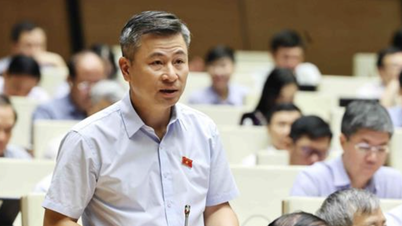


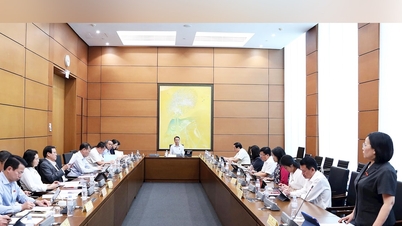



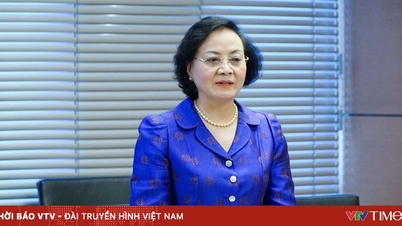






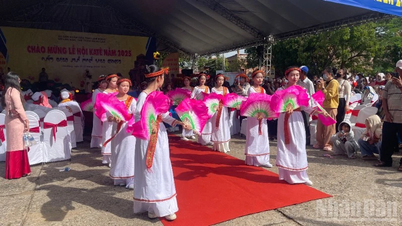
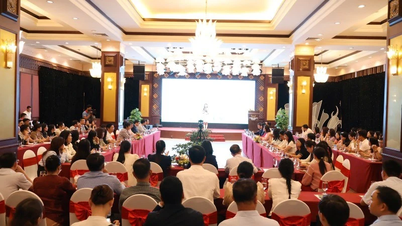
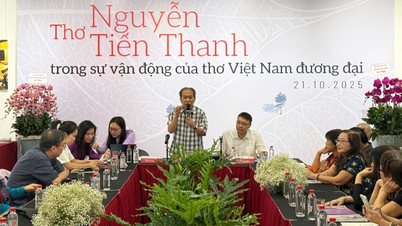

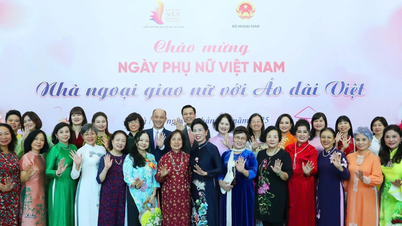







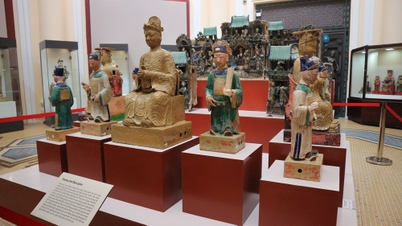
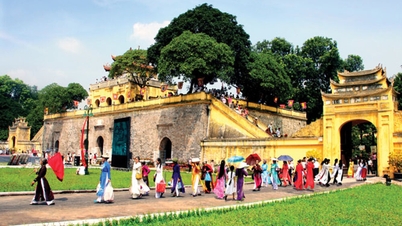









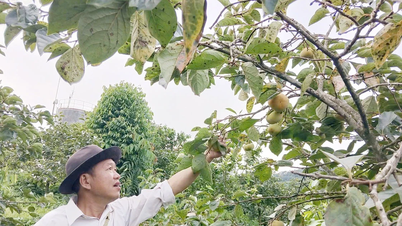










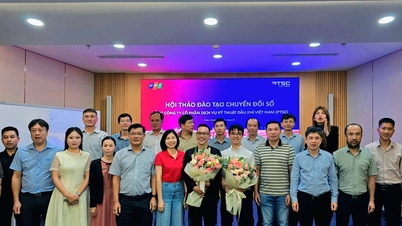






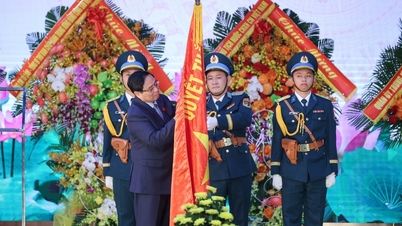









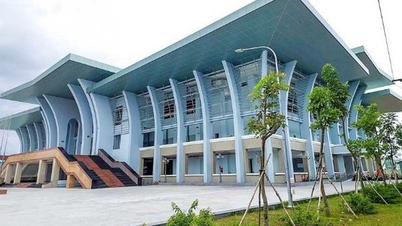
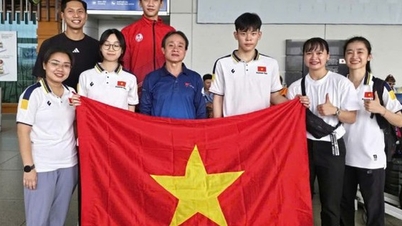
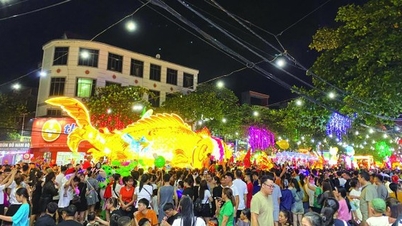
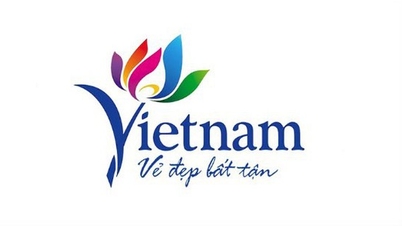
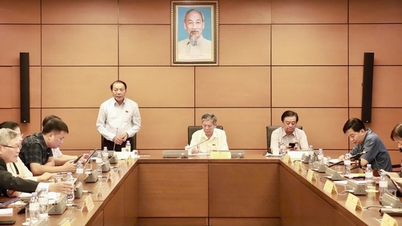


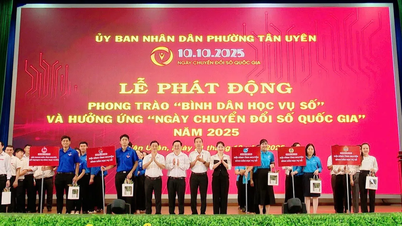
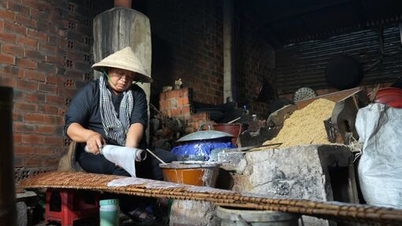



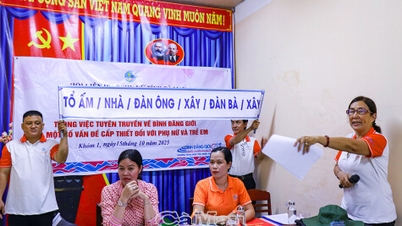

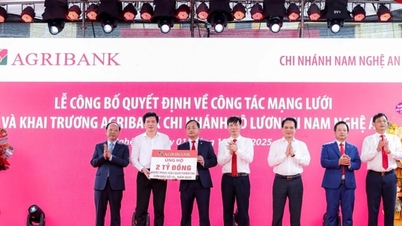











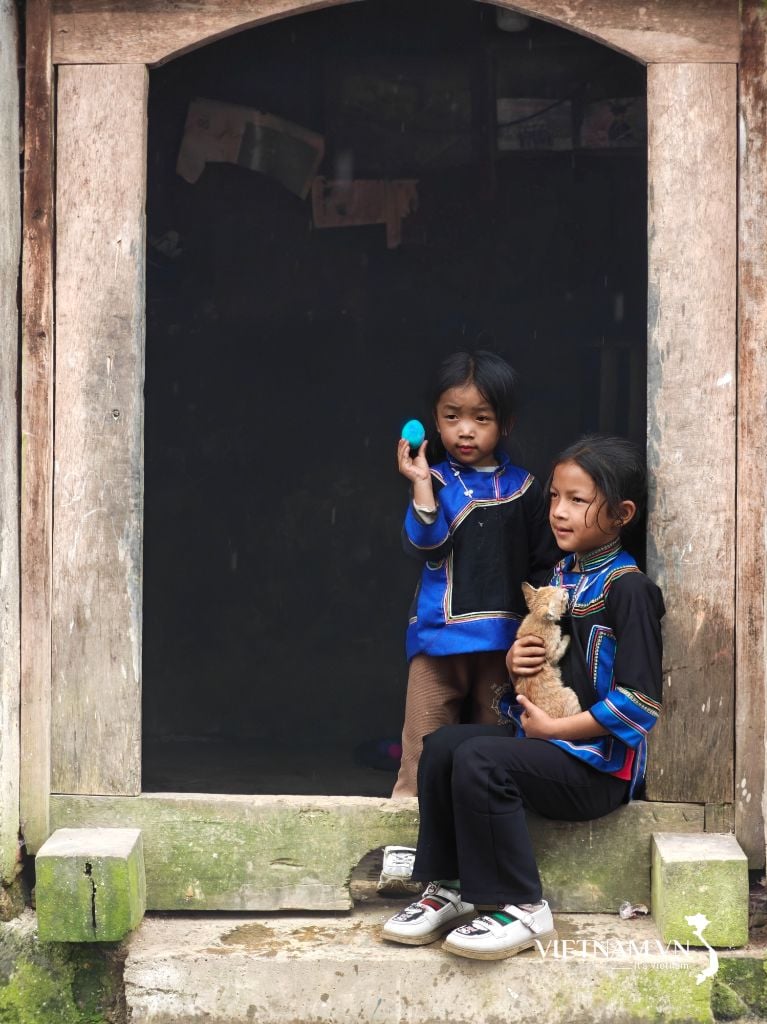

Comment (0)